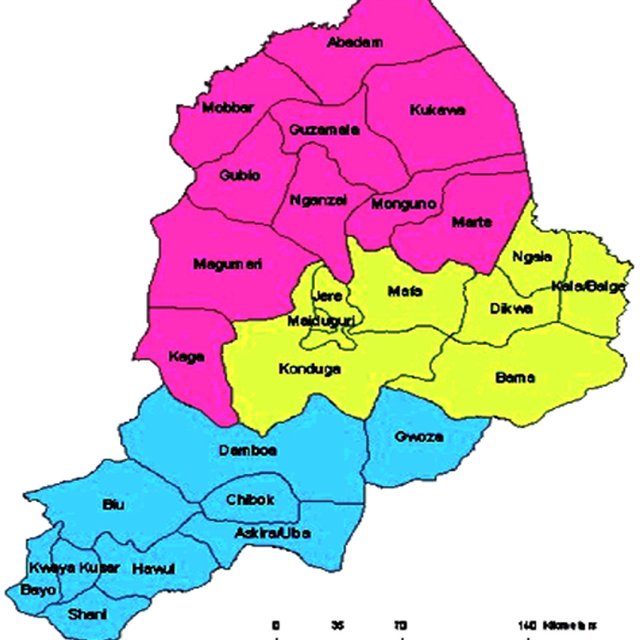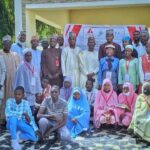Many people including a soldier and some wedding guests have been killed, and several others injured on Saturday, when four suicide bombers launched attacks at different spots in Gwoza and Pulka towns, all in Gwoza Local Government Area of Borno State.
Gwoza is located 128 kilometres, in the southern part of Maiduguri, the state capital.
The suicide attacks were launched on the same day when a man committed suicide in Anambra State, while a woman climbed the rail of a bridge, jumped and killed herself in Delta State.
Black day in Borno
In Gwoza, it was learnt that the first suicide incident was at a wedding reception in the Mararaba area of the town.
- Building collapse: 8 die in Kano, 2 rescued in Abuja
- Vigilante, one other killed as argument at viewing centre turned soar
Confirming the incident, the Director General of the State Emergency Management Agency (SEMA), Dr. Barkindo M. Saidu, said 18 persons died, and 19 others were seriously injured in the incidents.
“So far, we have 18 deaths, comprising children, adult male, females, and pregnant women, while the 19 persons that are seriously injured were conveyed to Maiduguri in four ambulances,” he said.
“Also, 23 are waiting for military escort in the Medical Regimental Services (MRS) Clinic. I am now coordinating for chopper this night. I have mobilised emergency drugs to complement the shortage of drugs in Gwoza,” he said.
The DG, who said he was on the spot in Gwoza, said the degree of injuries ranges from abdominal raptures, skull and limb fractures.
He said that the first suicide bomber detonated her explosive around 3:00pm, which affected over 30 wedding celebrants.
“Some minutes later, another blast occurred around General Hospital at the funeral services when another lady rushed onto the congregation and detonated another bomb with a lot of casualties.
“We were in the hospital coordinating the rescue mission, and another one exploded from a female teenager,” he said.
He also confirmed receiving a report that there was a suspected suicide bombing in Pulka town, also in Gwoza LGA, but did not give further details.
Our correspondent reliably gathered that the casualty figure might be higher, as families and acquaintances were still looking for their loved ones in the aftermath of the attacks.
A resident said: “It was a black day in Gwoza…The first woman came to a wedding reception while pretending to be looking for food. She ensured that she was in midst of the wedding reception before she detonated the explosive devices wrapped around her wrist.”
While some sources said the woman had a baby tied to her back, others said it was the bomb she concealed that was mistaken as a child.
According to the groom’s friend, eight people died instantly and many others were rushed to the hospital alongside a soldier and two civilians.
“The second incident was while people in the grieving community were trying to bury the dead,” another source said.
“The suicide bomber, who disguised as a mourner, detonated the improvised explosive device, which killed some people.
“According to the update received, over 10 persons were killed with several others injured”, the source said.
The source added that the third suicide attack happened in the Hausari area of Gwoza, claiming the lives of an unspecified number of people.
A security source confirmed the incident, saying up to 20 people lost their lives and dozens of others wounded.
Gwoza, located in the fringes of the Sambisa Forest and the Mandara Mountains, which serve as sanctuaries for Boko Haram fighters, had suffered devastating attacks in the nearly fifteen years of the insurgency.
Hundreds of people have been killed, many injured and houses, markets, hospitals, police stations and other symbols of authority destroyed.
In August 2014, Abubakar Shekau declared a caliphate in areas under Boko Haram’s control, with the town of Gwoza as its seat of power.
He dislodged all the residents, including the emir, and held sway for years before he was forced to retreat to the Sambisa Forest, where he was killed on May 19, 2021, by a faction led by Abu Musab al-Barwawi, the son of the Boko Haram founder, Mohammed Yusuf.
Soon after the recovery of Gwoza and other major towns, thousands of residents, who hitherto took refuge in Maiduguri, have been taken back to their ancestral towns after reconstruction by the Governor Babagana Zulum –led administration.
Incidents of suicide bombings have not been reported for a long time, until yesterday’s resurgence in Borno.
Anambra’s suicide followed hotel demolition
In the Anambra incident, a hotel owner identified as Malachy Chukwu, allegedly committed suicide over the demolition of his property.
Sources said the deceased took his life after discovering that his hotel had been demolished by suspected youths of the Ifite-Nteje community in Oyi Local Government Area of the state.
Our correspondent reported that following the alleged suicide incident, members of the Divine Heaven Amalgamated Landlords Association, Ifite-Nteje in the locality staged a protest.
The protesters, comprising men and women, said several buildings, including a hotel located on Chinua Achebe Airport Road, worth billions of naira, were allegedly destroyed by a group parading themselves as the executive members of Ifite-Nteje Development Union.
Chairman of the aggrieved residents, Chief Patrick Maduegbuna, appealed to Governor Charles Soludo to intervene to foreclose a total breakdown of law and order.
The association’s Secretary, Mr. Nwako Maduka, said the landlords paid all the required dues and the documents signed by the same people allegedly trying to revoke the land sold to them genuinely.
The chairman of the Ifite-Nteje Land Management Committee, Chief Ikechukwu Erikeife, said some young men who sold their plots were making efforts to sell the same land for the second time, noting that land grabbing to make money at all costs was the source of confusion in Ifite-Nteje.
It was gathered that about 70 associations acquired the vast land occupying a strategic position along the airport road, as most of the buildings destroyed were at various stages of completion.
The woman that fell from a bridge
In the Delta State incident, a yet-to-be identified woman reportedly committed suicide in Effurun roundabout in Uvwie Local Government Area by falling backwards from a bridge.
In a viral video, she was seen jumping from the flyover that leads to Refinery Road, Ekpan.
One source, who pleaded anonymity, attributed her death to depression and advised that people should check on one another, especially in these trying times.
“Depression is a disease that is treatable, and we must never, ever succumb to it,” the source said.
“No matter what is happening, it is only temporary; for where there is life, there is hope, and that is one of the great mysteries of life,” he added.
The Police Public Relations Officer in Delta State did not respond to calls put to his telephone line.
Daily Trust on Sunday reports that Saturday’s incidents came two days after Mr. Nick Imudia, a former CEO of Konga Limited, one of Nigeria’s major e-commerce platforms, reportedly jumped from the balcony of his duplex in Lekki, Lagos, and died on the spot.
Before his death, the Ika Local Government Area of Delta State-born billionaire was said to have contacted his younger brother in the United States of America, to instruct him on how to distribute his wealth, should anything happen to him.
Muslim, Christian clerics speak on rising suicide in Nigeria
An Abuja based Islamic scholar, Sheik Muhammad Nuru Khalid, has said that ignorance on the part of those committing suicide on the implications of their actions is one of the factors aggravating the problem.
“Islam clearly forbids anyone from committing suicide not under any circumstance. One of the solutions is enlightenment, fear of Allah and having firm faith in Him (Allah) to resolve all challenges that human beings can face,” Sheik Khalid said, while reacting to yesterday’s incidents.
On his part, Pastor Joseph Kayode Adeleke of the Christ Apostolic Church (CAC), Abuja, said that while economic hardship could be blamed for the rising suicide cases across the country, especially the ones in Anambra and Delta, it was not enough for people to resort to suicide.
“Beyond poverty and economic hardship, many of the wealthy people are also indebted and could not meet up repaying their loans and debts.
“Part of the solutions is for Nigerians to be closer to God, and be righteous. Godlessness is making many people to be involved in illegalities. We also need to see ourselves as brothers and sisters and also help ourselves to overcome the present hardships and other challenges,” Pastor Adeleke said.

 Join Daily Trust WhatsApp Community For Quick Access To News and Happenings Around You.
Join Daily Trust WhatsApp Community For Quick Access To News and Happenings Around You.


